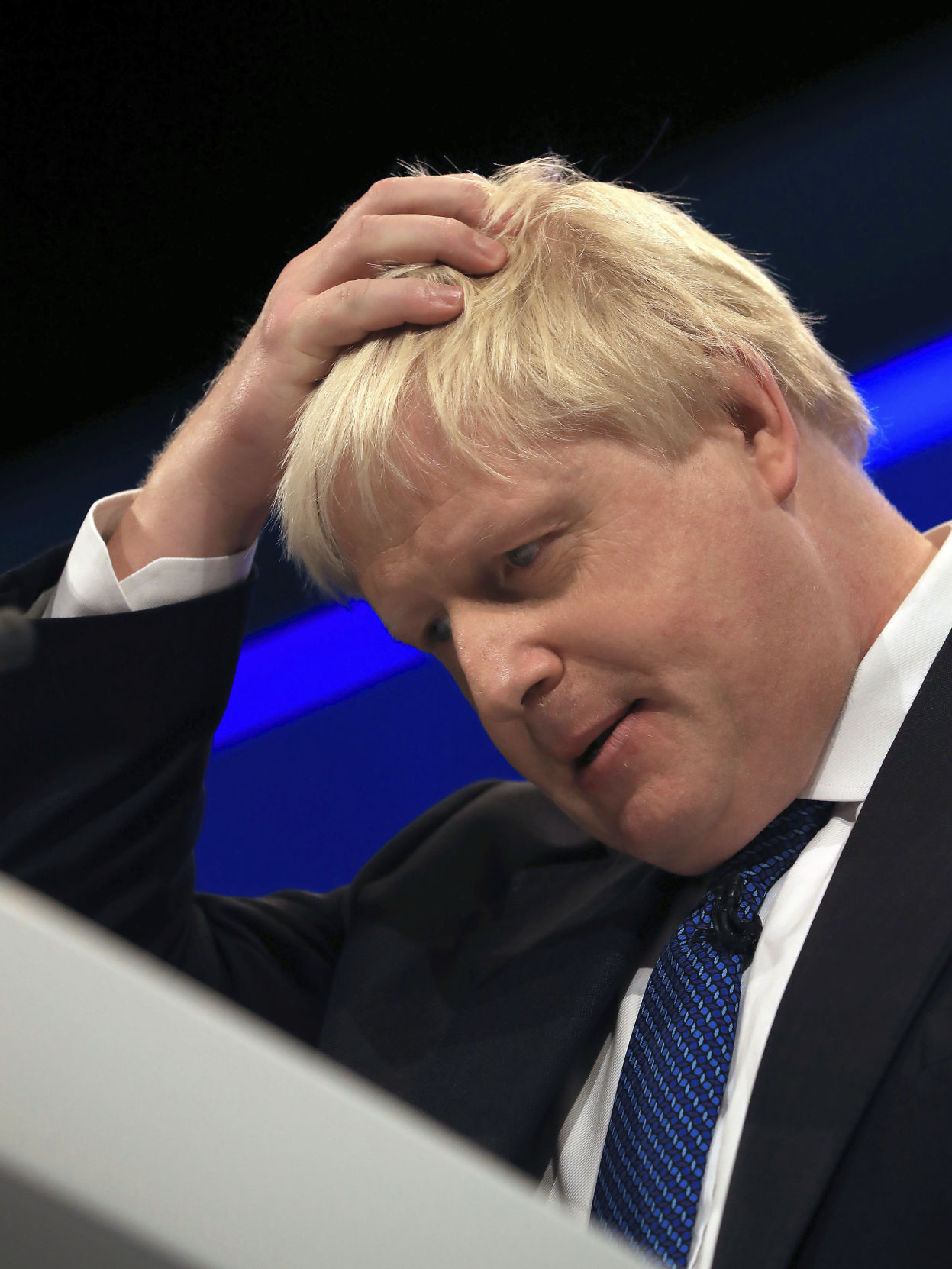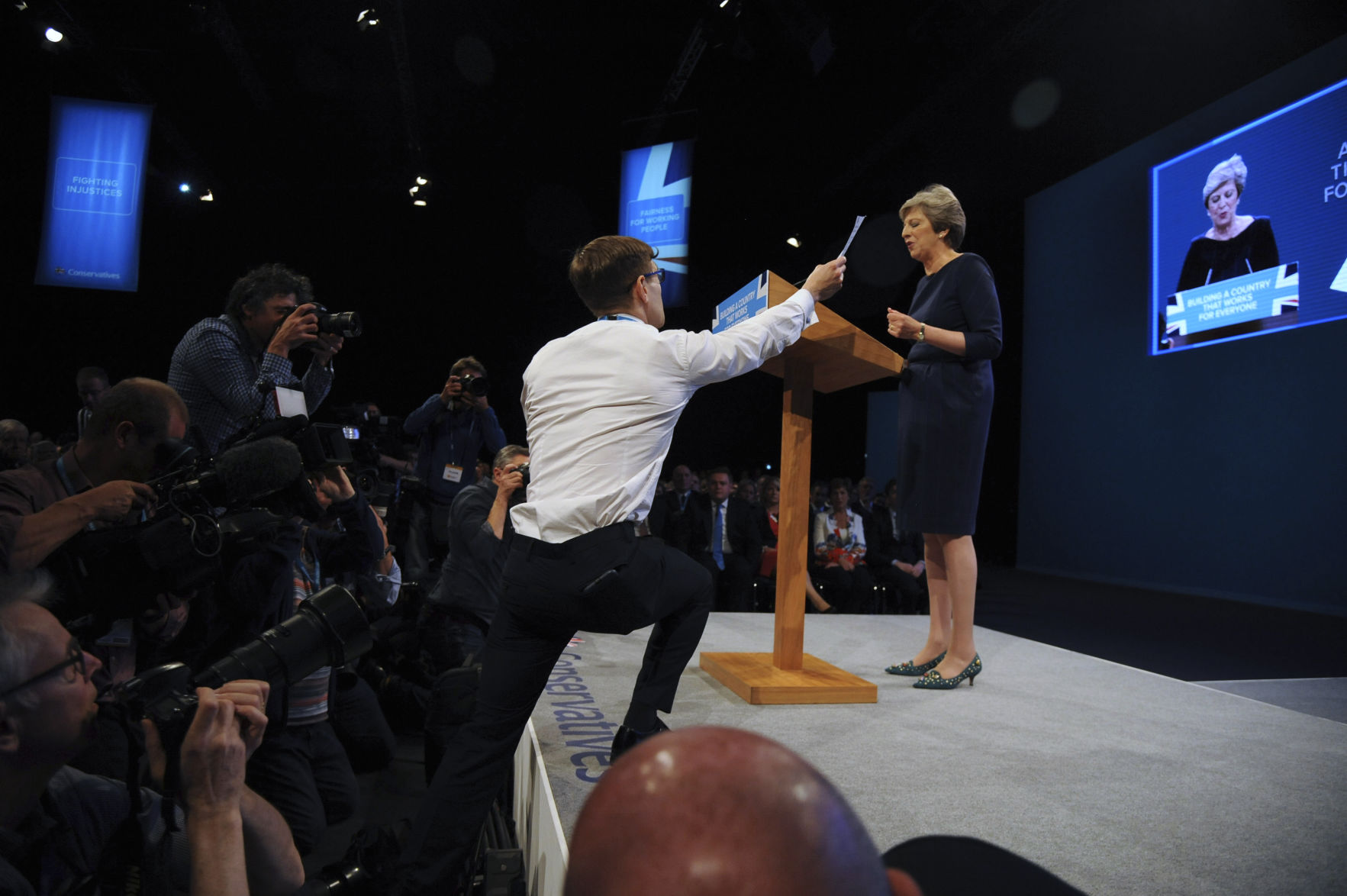MANCHESTER, England (AP) — The Latest on Prime Minister Theresa May’s keynote speech to her Conservative Party base (all times local): 1:45 p.m. Britain’s governing Conservative Party is reviewing security after a comedian managed to walk up to Prime Minister
MANCHESTER, England (AP) — The Latest on Prime Minister Theresa May’s keynote speech to her Conservative Party base (all times local):
1:45 p.m.
Britain’s governing Conservative Party is reviewing security after a comedian managed to walk up to Prime Minister Theresa May during a speech and hand her an unemployment form.
The prankster — identified in media reports as comedian Simon Brodkin — handed May a P45, the form given to people being laid off, as she was addressing the Conservative conference in Manchester.
As he was bundled away by security, the joker said “Boris told me to do it.”
Foreign Secretary Boris Johnson is widely seen as a rival for May’s job.
May’s office says the prankster has been arrested for breach of the peace and there will be a “thorough investigation” of how he was able to get into the high-security conference venue.
Brodkin, whose stage name is Lee Nelson, has pulled off other high-profile stunts including showering international soccer federation president Sepp Blatter with money during a 2015 press conference.
———
12:45 p.m.
British Prime Minister Theresa May says she is “getting the government back into the business of building houses,” a significant shift away from years of government policy that left house-building largely to the private sector.
She says that “for 30 or 40 years we simply haven’t built enough homes,” and as a result the average home now costs eight times average earnings in Britain.
May told her party conference on Wednesday that the government would kick-start “a new generation of council houses to help fix our broken housing market.” She didn’t provide details about how much such public housing would cost or how many of them would be built.
Rising prices have made home ownership an increasingly elusive goal for many, especially in London and other big cities across Britain.
———
12:25 p.m.
British Prime Minister Theresa May says the government is preparing for “every eventuality” in Brexit negotiations, including the possibility of them ending without a deal.
May says “it is profoundly in our interests for the negotiations to succeed” and result in a new relationship between the U.K. and the bloc.
But she says “it is our responsibility as a government to prepare for every eventuality. And let me reassure everyone in this hall — that is exactly what we are doing.”
Both Britain and the EU have expressed impatience with the slow progress of Brexit talks, which are bogged down in details of the divorce agreement.
———
12 p.m.
British Prime Minister Theresa May has apologized to Conservatives for the party’s poor election result, saying it was “too scripted” and “too presidential.”
May is addressing Conservatives at the close of the party’s annual conference on Wednesday.
The mood has been dampened by the party’s poor showing in June’s national election, which saw the Tories reduced to a minority administration.
She said: “I led the campaign, and I am sorry.”
May is trying to regain momentum by painting the government as a champion of aspiration. She says that for many Britons, “the British dream … feels increasingly out of reach.”
———
10:35 a.m.
British Prime Minister Theresa May will announce a plan for new government-built homes as she tries to restore momentum to her divided administration.
May’s Conservative Party is in a sour mood after a June election saw it reduced to a minority government. The poor result left a weakened May struggling to unite the government around policies for Brexit and other issues.
May’s office says she will close the party’s conference Wednesday with a speech telling ministers to “shape up” and focus on “the daily lives of ordinary working people.”
Deputy leader Damian Green says she will also announce “a return to council house-building.”
That would be a major shift for the Conservatives, who have left house-building largely to the private sector.
Rising prices have made home ownership unaffordable for many.




